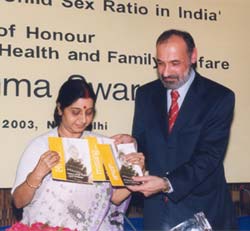Press Release
UNFPA Calls Decade of "Missing" Girls, Discrimination, Alarming
28 October 2003
Press Release
28 October 2003
UNITED NATIONS, New York — A new booklet, which consolidates data that show a shocking decline in the number of girls compared to boys in India during the last decade due to the elimination of girls by sex-selective abortion and infanticide, has drawn strong responses.
"These findings reveal an alarming trend, which must be addressed," said Thoraya Ahmed Obaid, the Executive Director of UNFPA, the United Nations Population Fund. "Discrimination against girls anywhere in the world is a social ill and human rights violation, which must be stopped. Girls, like boys, deserve equal love, equal opportunity and equal rights."

The booklet, Missing: Mapping the Adverse Child Sex Ratio in India, was compiled by the Office of India’s Registrar-General and Census Commissioner, the Ministry of Health and Family Welfare, and UNFPA. It was launched in India by the Minister of Health, Sushma Swaraj.
Ms. Obaid commended the Government of India for addressing the issue openly. "It takes courage to move beyond denial and actively confront gender discrimination," she said. “Leadership is critical to progress for girls’ and women's rights."
Key findings in the booklet include:
According to the booklet, "one of the significant contributors to the adverse child sex ratio in India is the practice of elimination of female foetuses". However, it also notes the killing of newborn girls. "The girl child is killed by putting a sand bag on her face or by throttling her," a mother is quoted as saying. "It is not a rare phenomenon; it happens without any hindrance."
Indian laws prohibit sex selection.
Ms. Obaid said that the best way to end such practices was to recognize and promote the worth and inherent dignity of all individuals, female or male. "Girls and women should be able to develop their full potential as human beings," she said.
Speaking at the launch, UNFPA's Representative in India, Francois Farah, said: "Every daughter of this land is a human being in her own right and, as such, deserves all rights and entitlements, which society should promote, protect and uphold."
He said that the problem of "missing" girls was a result of son preference. Boys were desired to carry forward the family name and occupation, perform religious rites and support parents during old age. Girls, he said, were often viewed as 'paraya dhan', to be married away.
As a remedy, Mr. Farah called for greater advocacy by authorities, civil society groups, cultural, religious and media institutions to promote the value of the girl child and eliminate gender biases in prevalent social practices.
Missing will be launched in the states it highlights, to increase awareness of trends and foster action to prevent the elimination of girls and promote their rights.
* * *
UNFPA is the world's largest multilateral source of population assistance. Since it became operational in 1969, it has provided substantial assistance to developing countries, at their request, to meet reproductive health needs and support development efforts.
For copies of the booklet, or to speak with the UNFPA Representative in India, please contact Ms. Medha Soni at medha.soni@unfpa.org.in.
Contact Information:
Abubakar Dungus
Tel.: +1 (212) 297-5031
Email: dungus@unfpa.org
Ms. Medha Soni
UNFPA India
Email: medha.soni@unfpa.org.in